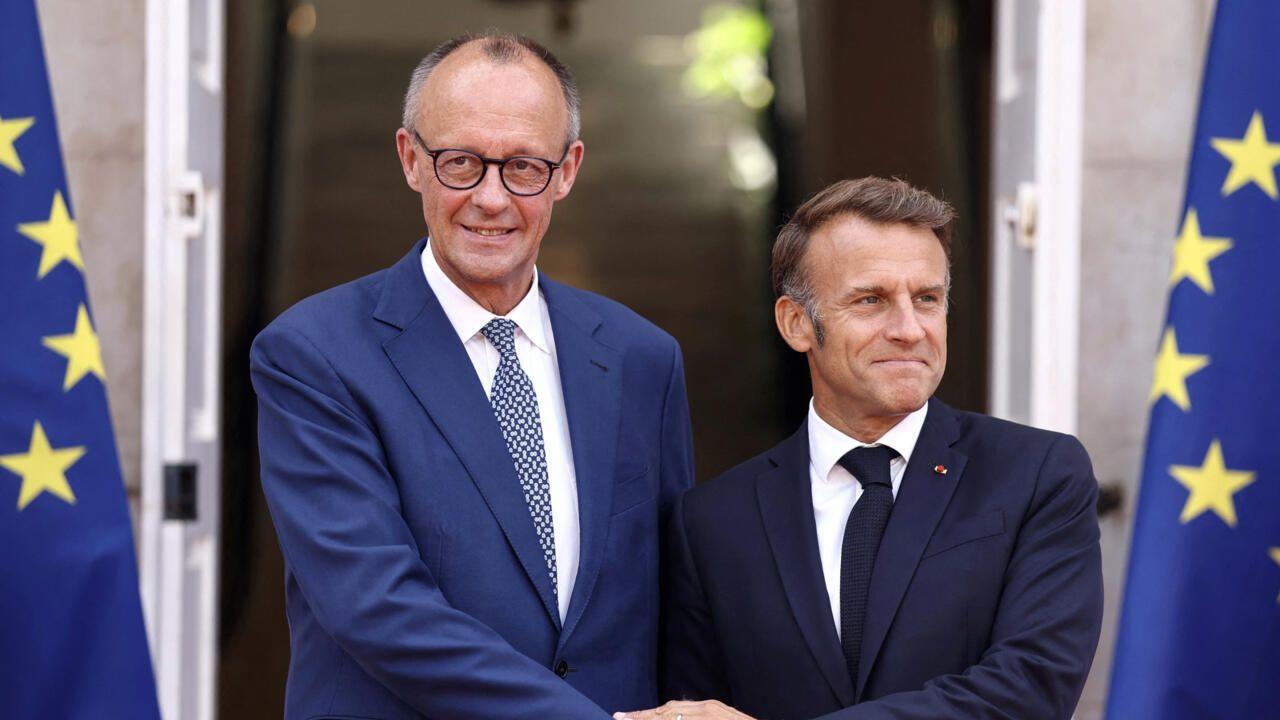Europe Pushes for Digital Sovereignty as Leaders Rally Against US Tech Dominance at Berlin Summit
2 Sources
2 Sources
[1]
Europe looks to catch up with US in AI race at German digital summit
Europe must strive to lead in the AI race, top officials urged Tuesday at a summit focused on propelling the region to the forefront of the digital era and reducing its reliance on US tech titans. As the Berlin gathering got underway, the EU also announced that Amazon and Microsoft cloud services could face stricter competition rules in the bloc as Brussels probes their market power. The summit brought together leaders from Europe's tech sector, and was to be addressed by German Chancellor Friedrich Merz and French President Emmanuel Macron later Tuesday. "Europe's goal is very simple: we want to lead, not follow, on AI and frontier technologies," European Commission digital chief Henna Virkkunen told the opening of the event. "We have the market, we have the talent, we have the ambition. Now we must deliver scale in investment, innovation and uptake." Europe is responding to calls to blaze its own digital path and take steps to catch up in the AI race against China and the United States. Concerns about US tech dominance have also grown as ties with Washington become increasingly uneasy under the "America First" administration of Donald Trump. Despite the US-Europe tensions, a senior official from the French presidency said the summit was not about "confrontation" with the United States or even China, but rather protecting "our core sovereignty". 'Become a creator' Arthur Mensch, CEO of French AI firm Mistral, told a panel at the summit that he had helped found the company as "we didn't want Europe to become an AI colony, and it was starting to look a bit like this in 2023". But European regulations needed to be better designed to help local companies, added Christian Klein, chief executive of German software giant SAP. "You need a framework here in Europe where you can build your business, where you can thrive," he said. His comments came a day before the EU was set to propose a rollback of its rules on AI and data protection -- a move welcomed by businesses, but criticized by privacy advocates. Virkkunen also announced the move against Amazon and Microsoft cloud services in Berlin, saying that twin investigations aim to assess whether the tech giants "should be designated as the gatekeepers on cloud computing". The European Commission, the bloc's digital regulator, said it will investigate whether Amazon Web Services (AWS) and Microsoft's Azure should come under the scope of the Digital Markets Act (DMA). Efforts to build up "sovereign" EU cloud computing capabilities, which proponents argue would better protect Europeans' data, were also being discussed in Berlin. Digital ministers from across Europe, as well as CEOs of tech firms like France's Mistral and Germany's SAP, were attending, and announcements on new digital initiatives were expected. 'Protect sovereignty' After giving their keynote addresses, Merz and Macron were to dine with British Prime Minister Keir Starmer. As well as worrying about US dependence, Europe has long-standing concerns about reliance on firms in China and other parts of Asia for hardware, from semiconductors to laptop components. But the continent faces an uphill battle to switch supply chains from foreign companies in the digital realm. The region is struggling after a period of prolonged economic weakness and its tech firms remain far smaller than their US rivals. As of last year, the continent's data centers -- crucial for AI -- had computing capacity of just 16 gigawatts, compared with 48 in the US and 38 in China, according to a recent study by German digital business association Bitkom. But Klein of SAP struck an upbeat note. "We have our own industries that we are good at," he said. "Let's apply AI in these battlegrounds, then Europe has a bright future."
[2]
Merz, Macron to push for European digital 'sovereignty'
Berlin (AFP) - German Chancellor Friedrich Merz and French President Emmanuel Macron will join forces Tuesday to push for greater European digital "sovereignty" and less dependence on US tech titans as the AI race gathers pace. The leaders of Europe's biggest economies will make the call at a Berlin summit, which will also be attended by CEOs of top regional firms including French AI company Mistral and German software giant SAP. With artificial intelligence set to play an increasingly important role in many sectors, Europe's leaders are responding to growing calls for the continent to take greater control of its own digital destiny. Concerns about American tech dominance have also escalated since the return of US President Donald Trump, who has questioned long-standing ties between the continent and Washington in many areas. German Digital Minister Karsten Wildberger said Monday that the summit's "core message" would be that "Europe is ready to shape its own digital future, to reduce dependence". "We can make better progress by working together," he added while attending a ground-breaking ceremony for an 11-billion-euro ($12.8 billion) data centre outside Berlin. The European Union in particular has been criticised for moving too slowly in the battle for AI dominance against the United States and China. The EU will propose a rollback of rules on AI and data protection later this week, a topic that is expected to feature prominently at the summit. Both European businesses struggling to catch up and American tech giants have complained about the regulations, although the EU now stands accused of putting competitiveness before citizens' privacy. Cloud computing concerns Another topic of discussion in Berlin will be efforts to build up "sovereign" EU cloud computing capabilities. Proponents argue such facilities would better protect Europeans' data in a sector currently dominated by US firms like Google, AWS and Microsoft. Fostering greater competition between industry and governments as well as creating "fair and efficient" digital markets will also be on the agenda. Merz and Macron are due to give keynote addresses in the afternoon at the summit, which will also be attended by digital ministers from across Europe. Both leaders will then have dinner with British Prime Minister Keir Starmer, a German government spokesman said, without revealing what the trio will talk about. Several announcements related to new digital initiatives are expected. As well as worries about US dependence, Europe has more long-standing concerns about reliance on firms from Communist Party-ruled China and other parts of Asia for hardware, from semiconductors to laptop components. According to a survey by digital business association Bitkom, about 90 percent of German companies that import digital goods or services consider themselves dependent on them. 'Europe must invest' Bitkom President Ralf Wintergerst said that Europe needed to urgently invest more in the digital sector. "Europe must not fall behind -- today's investments secure tomorrow's competitiveness and jobs," he told AFP. "If Europe does not want to become a museum of technology, we must ramp up investment significantly." But Europe faces an uphill battle. The region is struggling after a period of prolonged economic weakness and its tech firms remain far smaller than their US rivals. As of last year the continent's data centres -- crucial for AI -- had computing capacity of just 16 gigawatts, compared with 48 in the US and 38 in China, according to a recent Bitkom study. And recent investment announcements in Germany -- billions of dollars from Google and a tie-up between US chip juggernaut Nvidia and Deutsche Telekom for an industrial AI hub -- have only highlighted the continued dependence on American tech, critics say. Despite the US-Europe tensions, a senior official from the French presidency said the summit was not about "confrontation" with the United States or even China. Rather it is about "how we protect our core sovereignty and what rules need to be established, especially at the European level", said the official.
Share
Share
Copy Link
European leaders gathered in Berlin to discuss reducing dependence on US tech giants and accelerating AI development. The summit featured calls for digital sovereignty while the EU announced investigations into Amazon and Microsoft cloud services.
European Leaders Unite for Digital Independence
European leaders gathered in Berlin for a high-profile digital summit aimed at reducing the continent's reliance on US technology giants and accelerating its position in the global AI race. German Chancellor Friedrich Merz and French President Emmanuel Macron led the charge, with European Commission digital chief Henna Virkkunen declaring that "Europe's goal is very simple: we want to lead, not follow, on AI and frontier technologies"
1
.
Source: France 24
The summit brought together digital ministers from across Europe and CEOs from major regional tech firms, including French AI company Mistral and German software giant SAP. The timing reflects growing concerns about American tech dominance, particularly as ties with Washington have become increasingly strained under Donald Trump's "America First" administration
2
.Regulatory Action Against Tech Giants
In a significant development coinciding with the summit, the European Commission announced investigations into Amazon Web Services (AWS) and Microsoft's Azure cloud services. The investigations will assess whether these platforms should be designated as "gatekeepers" under the Digital Markets Act (DMA), potentially subjecting them to stricter competition rules
1
.Virkkunen emphasized that the twin investigations aim to determine the tech giants' market power in cloud computing, a sector crucial for AI development. This regulatory move represents Europe's broader strategy to challenge US tech dominance through legislative measures while building its own digital capabilities.
Industry Leaders Call for Better Framework
Arthur Mensch, CEO of French AI firm Mistral, provided a stark assessment of Europe's position, stating he helped found the company because "we didn't want Europe to become an AI colony, and it was starting to look a bit like this in 2023"
1
. His comments underscore the urgency felt by European tech entrepreneurs to establish independent AI capabilities.
Source: Tech Xplore
Christian Klein, chief executive of German software giant SAP, called for better-designed European regulations to help local companies compete. "You need a framework here in Europe where you can build your business, where you can thrive," he told summit attendees
1
. His remarks came as the EU prepared to propose a rollback of its AI and data protection rules, a move welcomed by businesses but criticized by privacy advocates.Related Stories
Infrastructure and Investment Challenges
Europe faces significant infrastructure disadvantages in the AI race. According to a study by German digital business association Bitkom, the continent's data centers had computing capacity of just 16 gigawatts as of last year, compared with 48 gigawatts in the US and 38 in China
1
. This infrastructure gap highlights the scale of investment needed for Europe to compete effectively.Bitkom President Ralf Wintergerst warned that "Europe must not fall behind" and called for urgent investment increases. "If Europe does not want to become a museum of technology, we must ramp up investment significantly," he told AFP
2
. The challenge is compounded by Europe's prolonged economic weakness and the relatively small size of its tech firms compared to US rivals.Sovereign Cloud Computing Initiative
A key focus of the Berlin summit was developing "sovereign" EU cloud computing capabilities. Proponents argue that European-controlled cloud infrastructure would better protect citizens' data and reduce dependence on US providers like Google, AWS, and Microsoft
2
.German Digital Minister Karsten Wildberger emphasized that the summit's "core message" was that "Europe is ready to shape its own digital future, to reduce dependence." He added that "we can make better progress by working together" while attending a groundbreaking ceremony for an 11-billion-euro data center outside Berlin
2
.References
Summarized by
Navi
Related Stories
Recent Highlights
1
Pentagon threatens Anthropic with Defense Production Act over AI military use restrictions
Policy and Regulation

2
Google Gemini 3.1 Pro doubles reasoning score, beats rivals in key AI benchmarks
Technology

3
Anthropic accuses Chinese AI labs of stealing Claude through 24,000 fake accounts
Policy and Regulation








